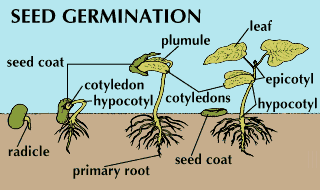|
The ability of seeds to endure harsh conditions and only germinate when the conditions are good is a miracle of the natural world. A seed is essentially life in a pill form that is just waiting to spring into action as soon as it can.  The process by which a seed germinates is a simple one with lots of fancy terms used to described it. To sum it up when a seed is exposed to water at the correct range of temperatures the seed will absorb or drink up the water. This water enters the cells in the seed and swells them up with water. At the same time the metabolic activity of the seed starts up and puts a whole sequence of events in play. First to emerge is the radicle of the plant which develops into the primary tap root of the plant. Then as the seed continues to expand the first shoot and cotyledon comes out the top of the seed. The cotyledon is the structure that contains the first leaves of the plant and this will soon open up and expose them to the sun and air. Once the cotyledon opens up and the first true leaves are exposed then you have a plant in its true form. What can affect germination? Germination can be affected by quite a few factors that exist in the natural world. Water is the crucial agent that starts the germination process and as such it is the once that can affect it the most. To much water and you can restrict oxygen from entering the seeds cells as they are growing and this will slow or kill the seed as it germinating. As I am sure you can imagine the opposite is true as well to little water and the see dries up halfway through the germination process. Temperature is also a key factor in germination success. It needs to be warm enough on a consistent basis in the soil for the seeds to get the hint that now is the time to germinate. Temperature can also affect germination in other ways as well. For example some seed types need prolonged exposure to cold temperatures before they will be able to germinate in the spring. Other seeds will need to be soaked or put through a process called scarification which weakens the seed coat enough for water and oxygen to penetrate it.
0 Comments
Leave a Reply. |
AuthorHello my name is Josh Larson and I am the creator of the Green Living Library. Here on the blog you will find updates to content found in the Green Living Library as well as stories from those living the sustainable life already. Archives
December 2021
Categories
All
|